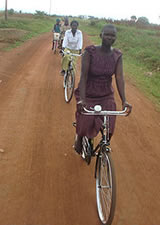Ugandan Women Lead Healing Process
 Thanks to Womens enews.
Thanks to Womens enews.
Women trying to rebuild life in northern Uganda are not yet safe enough for typical trauma counseling to be appropriate.
A U.S. charity finds it can still provide assistance by training local people who can then help survivors adapt, work and sleep.
Tragic events like terrorist attacks and natural disasters illustrate how strangers can come together selflessly and spontaneously, helping each other.
For each moment of horror there is a corresponding act of beauty and kindness.
But what happens when the initial crisis is over, leaving people to adjust to a new reality? Around the world, it is often women who strive to make life as bearable as possible for those who survive
A friend who worked in a Bosnia refugee camp told me, "The men rapidly fell apart, and the kids became silent; it was up to the women to get the family up every morning, feeding them and washing their clothes. If the women had let their feelings show, just for a moment, the whole edifice would have collapsed."
I interviewed a young mother in the West Bank's Ramallah who woke one day to find her apartment block encircled by tanks, their guns trained on her windows. "How could I explain it to my 7-year-old son? I baked him a cake shaped like a tank and used a chocolate bar as the gun. I had to normalize the situation for him."
In the case of northern Uganda it is hard to "normalize" the new reality. For 23 years unarmed civilians endured a war that shattered villages and families. Many who supported their families through unimaginable hardship now face a sense of anti-climax and depression. Anyone who has cared for someone during a terminal illness recognizes this feeling. Once the funeral is past, the bleakness of continuing life alone can be overwhelming.
Great Challenges
The challenges could not be greater than in northern Uganda. Thirty thousand children were forced to become soldiers, brutalized by the notoriously vicious Lord's Resistance Army. Kids were forced to kill or be killed.
As yesterday's Women's eNews story reported, girls were gang raped and bore children for the soldiers who abused them.
Thousands were abducted, often for years at a time, and at the height of the war nearly 2 million northern Ugandans were forced into refugee camps.
Click here to read the full story:
By Rebecca Tinsley
Womens enews
Photo CreditSophie McCann